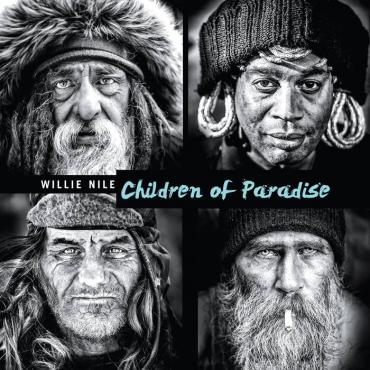Willie Nile Addresses the Ills of the World

Over the course of 35-plus years and 11 albums of original music, Willie Nile has proven himself a virtuosic melodist, crafting songs that play and replay in the head hours and days after being heard. While his 1980 debut showcased Nile’s garage-y/lo-fi inclinations, his later releases, including 2006’s Streets of New York, 2013’s American Ride, and 2016’s World War Willie, are chock full of well-produced and well-sequenced songs that blend rock approaches with punk attitude, including such gems as “Asking Annie Out,” “Faded Flower of Broadway,” “Life on Bleeker Street,” “Say Hey,” “American Ride,” and “Forever Wild,” tracks every bit as memorable as various hits by Nile’s contemporaries, Tom Petty, Bruce Springsteen, Lou Reed, and The Clash.
On his 12th album, Children of Paradise, Nile offers songs that mostly address the social and environmental plight of the world, implicitly commenting on the problematic aspects of human nature. On much of the album, unfortunately, predictable lyrics overshadow melody and riff (hooks), though there are moments in which Nile demonstrates his songwriting talents. “Don’t” opens with a driving riff reminiscent of Thin Lizzy, Nile’s lyrics at once tongue-in-cheek and cliché (“don’t let the fuckers kill your buzz,” “they do it all for the money/in the land of milk and honey”). “Earth Blues” is another guitar-driven song, Nile’s commentary on the fate of the environment: “California’s burning, the fossil fuel clouds rise/when our grandchildren wake us up how are we gonna look them in the eyes?” The title song shows Nile sporting a Dylanesque vocal (cf. his album of Dylan covers, Positively Bob: Willie Nile sings Bob Dylan) and adopting a melody reminiscent of earlier work; that is, the song succeeds primarily as a song, regardless of the well-trodden phrasing (“say a prayer for the children of paradise”).
On “Getting Ugly Out There,” Nile takes to the acoustic guitar. His lyrical simplicity and wistful melody conjure associations with John Prine, a master at balancing the ambiguous and the direct. Nile’s lyrics are both heavy-handedly accessible and playfully oblique (“I saw the Baby Jesus on the midnight train/he was heading out of town under cover of rain”). Harmonies on the chorus serve to vitalize the hook. “Have I Ever Told You” vacillates between the genuinely romantic and the formulaically saccharine: “When day light is fading/and moonlight is waiting/my hands stop from shaking/because baby I’m holding you now.” “Looking for Someone” opens with a folkish guitar-and-mandolin mix, one of the album’s instrumental highlights. Nile’s melody here is also a standout moment, a vehicle for one of his more sophisticated lyrics: “There’s a bottle of whiskey on a window ledge/I wanna be a painting I don’t wanna be a sketch.” The closing song, “All God’s Children,” ends the album on a note of gospel-infused hope: “All God’s children gonna sing someday.”
Children of Paradise was prompted, it seems, by a sense of frustration with the world’s or at least the U.S.’s status, though consistently missing is Nile’s impeccable pop sensibility. As said before, message frequently takes center stage over song, which is problematic for Nile, as his fortes are melody and riff, not necessarily the lyric. Nile is certainly an unsung hero, and each of the abovementioned releases from 2006, 2013, and 2016 will remain, for me, a rock-and-roll go-to. That said, heroes too have their lukewarm moments.




